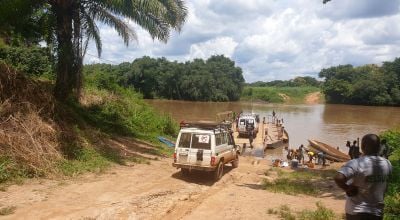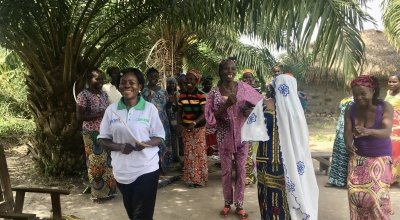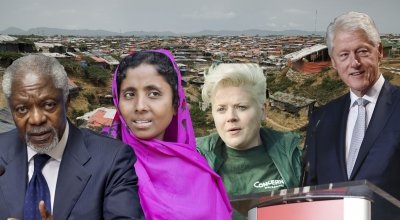
Read our 2023 annual report

Knowledge Hub
The Central African Republic: a crisis unfolding under the radar
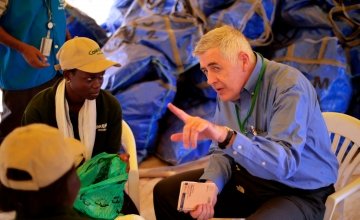
In the first week of the New Year, Concern’s CEO Dominic MacSorley reflects on the global humanitarian challenges before us in 2017, with a focus on the often under-reported conflict in the Central African Republic.
As we begin work in 2017, the scale of the global humanitarian challenge that lies before us has perhaps never been so immense in the modern era. The United Nations Global Humanitarian Funding Appeal for 2017 requires a record $22.2 billion and is dominated by the needs of people caught up in protracted crises in Syria, Yemen, Iraq and South Sudan. However, given the fact that the 2016 humanitarian funding gap was the largest ever recorded, with just over half the requested funding for the year received by the end of December, it is likely that the funding gap will continue to grow.
As the scourge of global conflict continues to create such great humanitarian need and demand for resources, these funding shortfalls become more pronounced year-on-year, effectively creating desperate competition for humanitarian funding. In this environment, it is often the countries caught up in the crises that are furthest from the headlines and public consciousness that suffer the hardest.
Conflict in the Central African Republic
The Central African Republic (CAR) is one of these countries. It is an outlier. Along the spectrum of the 28 countries where Concern is operational, I would venture to guess that this is the one people know least about.
It is only in recent years, as conflict has worsened and the humanitarian situation in the country has deteriorated, that the Central African Republic has reappeared on the global radar. The brutal civil conflict that has plagued the country, particularly since fighting intensified in 2013, has been characterised by ferociously high levels of sexual violence and deliberate killing of civilians. The country’s relative anonymity has shifted only marginally.
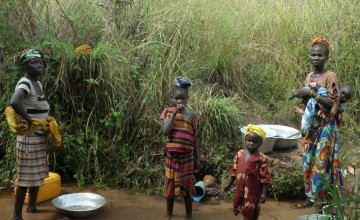
A remote country of contrasts and complexity
There’s only one flight into the Central African Republic from Europe per week. That’s the one I took with Peter Crichton, Concern’s Senior Humanitarian Advisor, from Paris to Bangui more than five years ago to do a preliminary assessment for Concern. A journey into a small, conflict ravaged country that I will never forget.
We found a country of contrasts and complexity. One of staggering natural beauty but also one of desperation, ominous insecurity and extreme violence. These were people that had suffered the ravages of colonialism, despotism and deeply ingrained poverty for years and who were now experiencing a period of conflict and volatility like never before.
Unforgettable destruction and desperation
The burden of mere survival inflicted by this turmoil was evident amongst the hundreds of thousands of families who had been terrorised and uprooted by the conflict.
Among them, a young woman who had been sheltering in the forest for months with her children. Her village had been attacked, the animals slaughtered and the water source poisoned. Too afraid to return, she asked me if I could remember passing her house a few miles up the dirt road. She described it to me as the last house in the village before the turn off for the forest.
Sadly there was no house – all of the houses in the village had been destroyed, burnt to the ground. I guess she knew that but perhaps she hoped that it wasn’t true. The look of desperation on her face stayed with me for a long time and only really began to fade when we set up operations in the country.
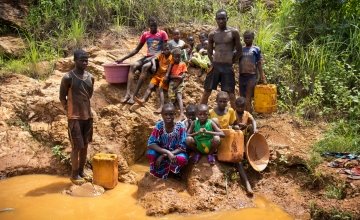
Reaching those in grave need of assistance
“Today, 40 per cent of the population depends on humanitarian assistance to survive. It is a matter of life and death for many Central Africans,” explained the United Nations Humanitarian coordinator for CAR in November.
Unfortunately an acute lack of funding and the high levels of violence and insecurity have discouraged many international agencies from establishing lifesaving operations on the ground. Such vast unfulfilled need means that Central African Republic ranks among the worst places on earth to be displaced.
This is where Concern needs to be. And though undoubtedly difficult to operate in, it is not impossible. Today we are reaching over 200,000 people in CAR, saving, protecting and rebuilding the lives of those in desperate need. This is who we are, this is what we do.
As we continue to work in more fragile environments in 2017 and beyond, we seek to direct our resources to address needs where they are most desperate. The Central African Republic epitomises many of the greatest challenges of this endeavour.
The dearth of other NGOs assigns a great responsibility to those that are there. A crucial aspect of this responsibility involves raising the international profile of the crisis and the communities that are affected by it, particularly as the global gap between needs and resources becomes more stretched.
A mission grounded in compassion and empathy
This year marks 50 years since the outbreak of the Biafran War. It was out of the response to this conflict, and the horrific human suffering it created, that we forged our mission. In Ireland, our response was made possible by the outpouring of support from the public who saw for the first time, the ravages of conflict and famine on their television screens. These images awoke an empathy in the consciousness of the Irish public and a compassion towards the suffering of others that has supported our work in some of the world’s most difficult environments ever since.
It is this compassion that we aim to inspire when raising funds for operations in areas such as the Central African Republic. Our endeavour is ambitious but it remains grounded in a simple basis of empathy towards human suffering. The world is very different to what it was in 1967 but in 2017, amidst the continuing catastrophe of Syria and other conflicts, and the barrage of dizzying statistics and figures, we must always retain a primary focus on the suffering of those who are affected.
Compassion. Connection. Empathy. Engagement.
You cannot take the human out of humanitarian.
Follow @aidwkr on Twitter
For more updates, follow Dominic MacSorley on Twitter.
Read more



